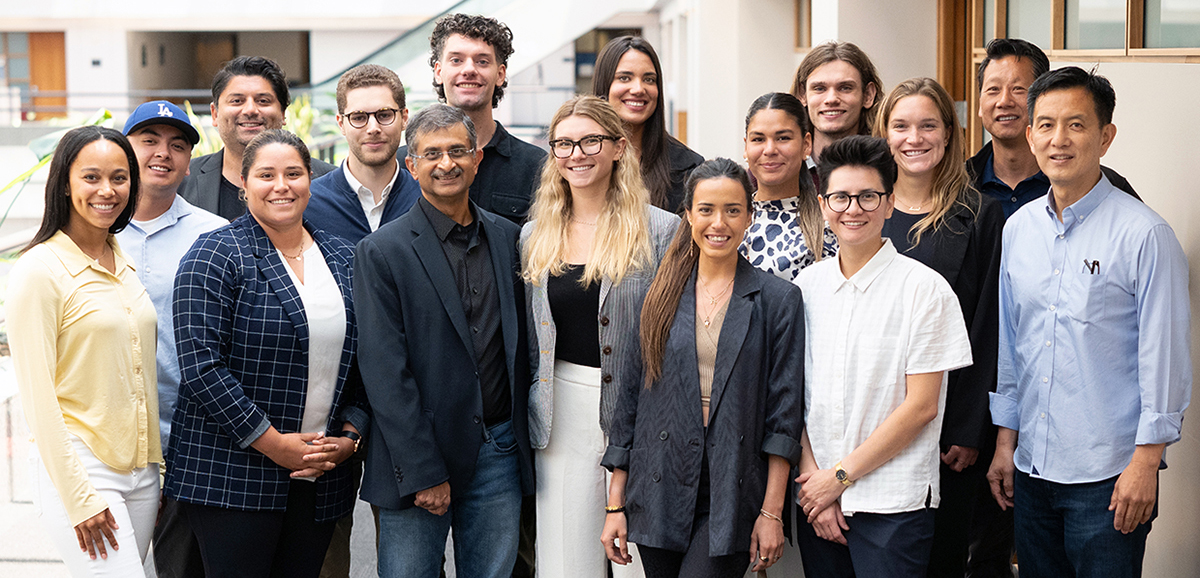
The M.S. in Entrepreneurship and Sustainable Innovation (MSESI) capstone project allows students to put their newfound knowledge into action by either developing an entrepreneurial idea (a new venture) or solving challenges for existing businesses (a sponsored project).
“The MSESI capstone presentations exemplify the goal of the program which is to develop entrepreneurial leaders who contribute to a more sustainable and resilient world through the creation and development of innovative products, services, processes, and enterprises,” said Sunil Murthy, MSESI academic program director.
Students had the opportunity to showcase their entrepreneurial skills during their final capstone presentations to faculty, staff, students, and industry guests. Students presented background information about their clients as well as the project’s objective, scope, and recommendations. For new ventures, students discussed their business plans which included the problem, business solution, opportunity size, target customer, value proposition, competition, business assumptions, financial and investment projections, critical resources, and key milestones.
Alex Moore delivered the first presentation on Bite, an innovative company that sells toothpaste tablets and other plastic-free oral/personal care products. Alex’s project explored new marketing strategies, industry trends, consumer segmentation, tagline testing, and an email campaign. His capstone project contributed to Bite’s goal of increasing email volume and experimenting with SMS marketing. Neil Bakshi, senior manager of supply chain at Bite, noted, “Having insights from younger consumers that challenged the company’s assumptions was extremely helpful.”
Next up, Emily Anderson presented her new venture, Third Space, which aims to tackle loneliness by creating a larger social network for people through unique local events and group activities. “Third Space acts as your social butterfly friend that always wants you out and about when you hang out with them, you never regret it,” said Emily. Customers pay to attend events such as a pickleball picnic or art in the park.
A student team featuring Isabella Barajas, Sofia Munera Sanchez, Elenore Johansen, and Alba De Lucas-Ibanez worked with Novica, an e-commerce website that enables artisans to sell their handcrafted goods to customers worldwide, on the launch of a new business, handmade.com. The students helped define the messaging and seller recruitment strategy for homemade.com by writing and conducting surveys in English and Spanish to gather feedback and perceptions of similar online platforms. The student team recommended a “super seller” program to create a seller community on the platform and drive seller loyalty. They also presented mock-ups of how sellers could create their home pages on Handmade.com and proposed community guidelines, including aspirations and values for the community.
Bailey Jennings developed Chaser, a healthy, multi-purpose, non-alcoholic cocktail mixer. More and more people are abstaining from consuming alcohol but still want to be part of the social scene. Chaser’s mocktails fill gaps in the market by providing new flavors and better packaging with an innovative, recyclable, peel-top metal can that is usable as a cup. The global market opportunity is big, especially in Asia. Bailey plans to sell Chaser’s mocktails at local farmers markets, small independent grocery stores, and non-alcoholic boutique stores.
Shred Cycle, Inc., started by Jessie Frietze-Armenta, MBA ’21, engaged Danyelle Chota, Frances Royer, and Nicolas Marten in a sponsored project for a sustainable surfboard roof rack pad made with upcycled skateboard wheels. The company’s goal is to make sustainability easy and approachable for action sports enthusiasts. The student team worked on the design and manufacturing of the roof rack pad, looking at its environmental impact, leveraging past prototypes, and iterating to create the final product. They also worked on the product’s lifecycle, sales strategy, and manufacturing process optimization through machine automation, and generated brand awareness and buzz around the product through launch events, social media campaigns, and partnerships.
The last capstone presentation was Grounds to Grow LA, created by Constantinos Chiambas and Adam Nishino, which repurposes coffee grounds collected from coffee shops in Los Angeles into fertilizer. It offers a sustainable and effective gardening solution for home garden enthusiasts, urban farmers, and environmentally conscious consumers. Constantinos walked the audience through their go-to-market plan which included educational programs and events, partnerships with local garden centers and nurseries, and selling at farmers markets and online.
“The students did a terrific job presenting their new ventures and corporate projects, all of which embodied the sustainable innovation goals of the MSESI program,” said Dayle Smith, dean of the College of Business Administration. “Research and insights, especially from different demographics, are key when innovating on strategy or product development. And storytelling is a powerful tool that entrepreneurs often use to turn their ideas into reality.”



